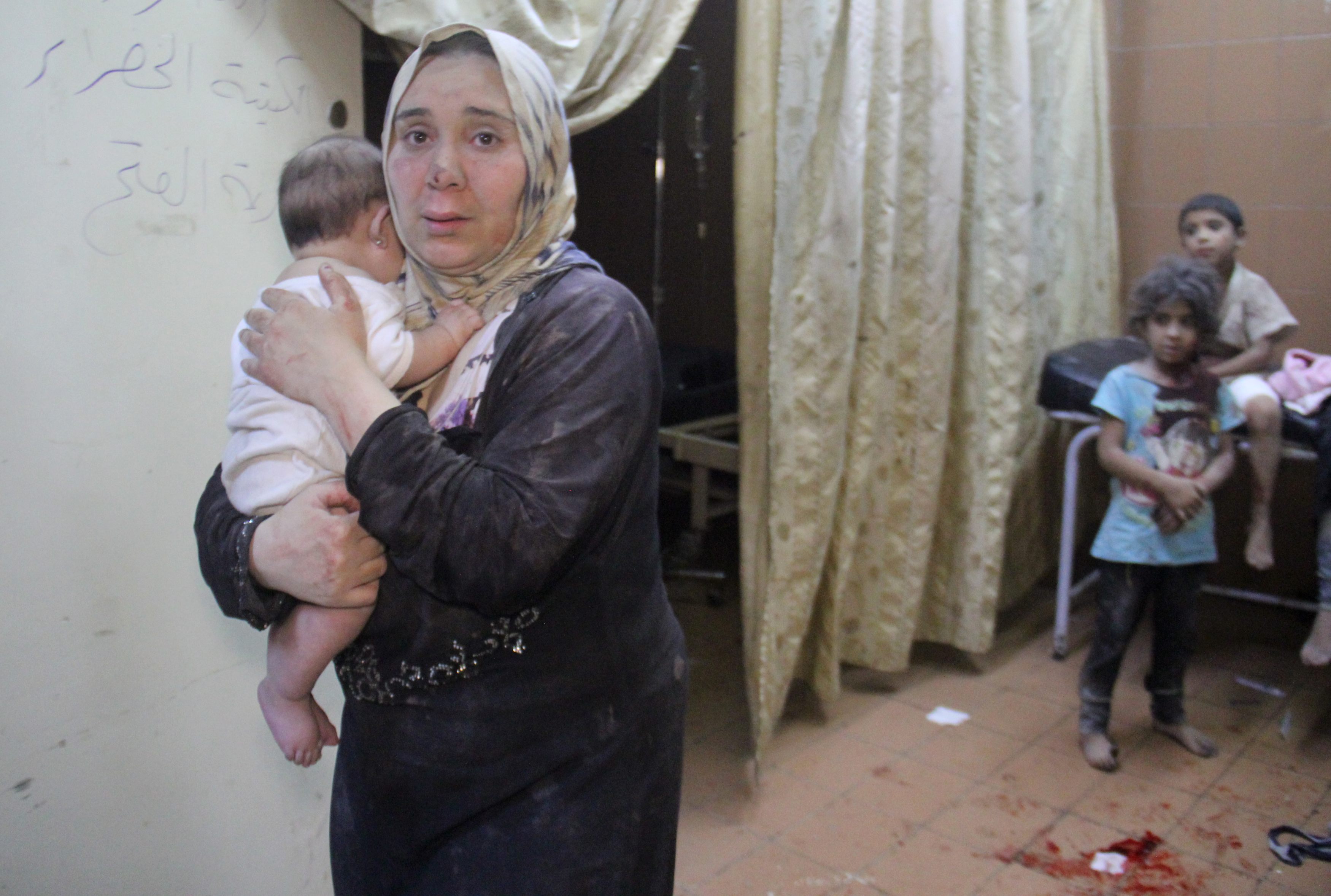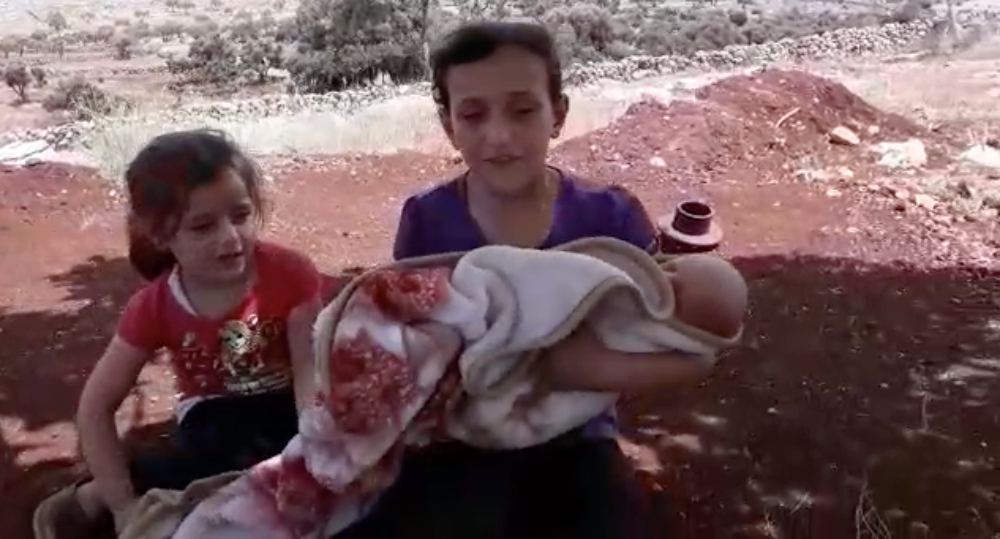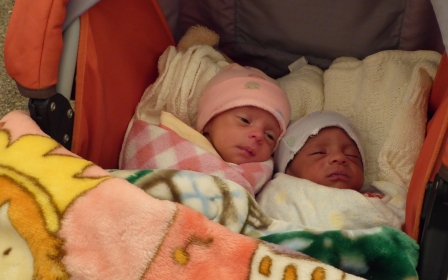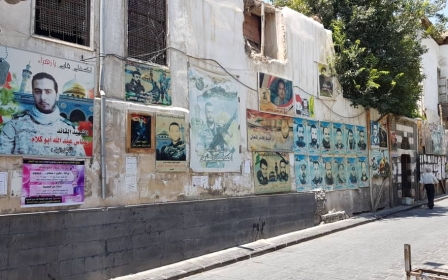Pregnant and alone: Syrian women fleeing Idlib offensive forced to give birth outdoors
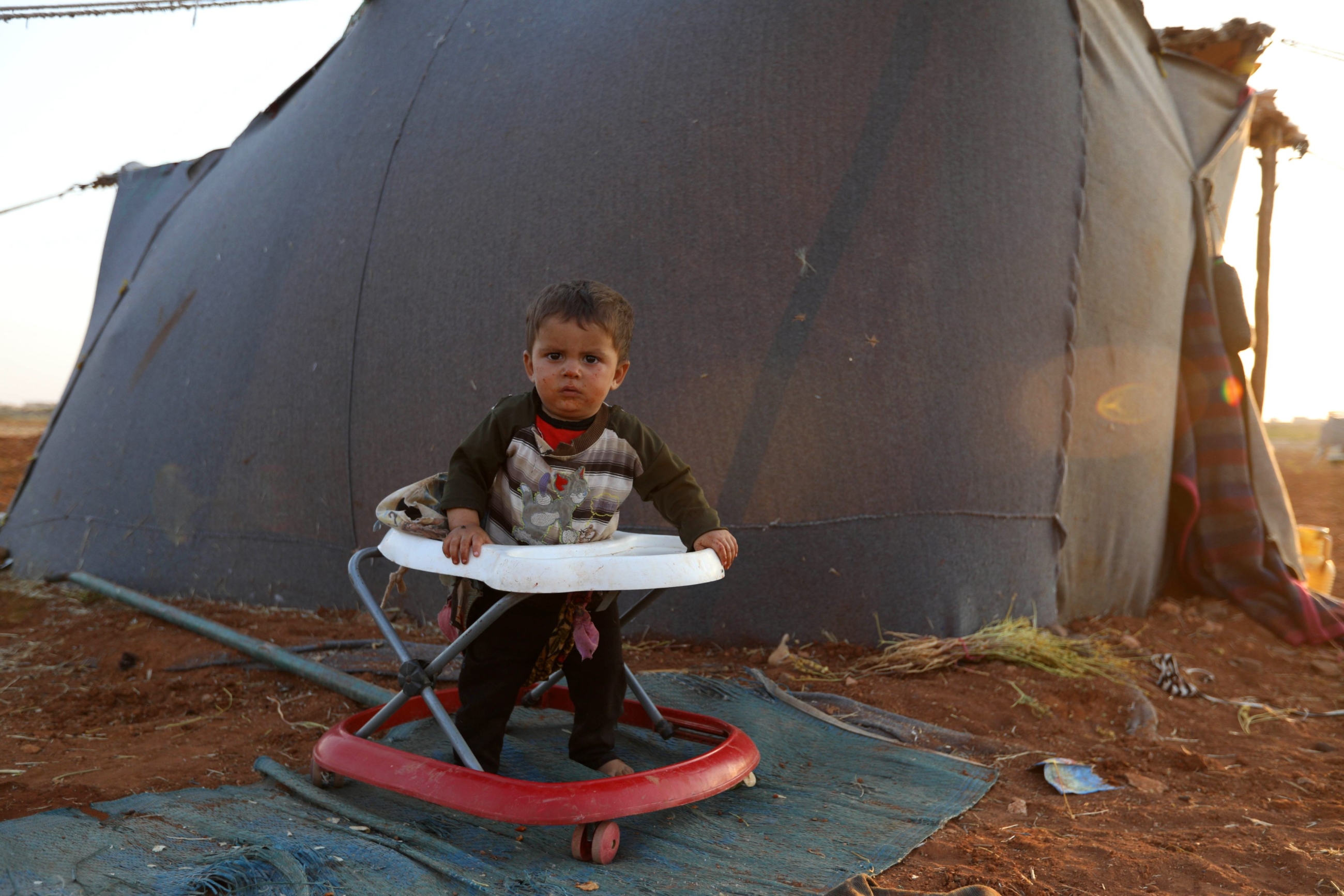
This was not how Rabaa al-Shamaa imagined the birth of her fifth child. Out in an open field near the Syrian-Turkish border, the expectant mother lay on the grass, doubled over in pain.
Just two weeks earlier, government air strikes had targeted her hometown in northwestern Syria, bombing its hospitals and sending Shamaa and her family fleeing north. They’d been sleeping in an olive grove ever since.
'I saw death one thousand times that day'
- Rabaa al-Shamaa, mother
As her contractions got closer, Shamaa feared she would have to give birth outdoors without any medical assistance.
“I spent hours in labour in the hot sun under a tree,” she told Middle East Eye. “I cannot begin to describe the pain.”
But upon hearing the roar of a nearby pickup truck, Shamaa’s husband managed to flag down the driver and convinced him to take the family to the nearest hospital.
“I arrived at the hospital with my last breath,” Shamaa said. Shortly after, her son Nasser was born, and Shamaa said she was discharged almost immediately.
“I saw death one thousand times that day,” she said. “I wouldn’t wish that on any mother in the world.”
Nowhere to turn
More than 300,000 Syrians like Shamaa have fled their homes since late April, when forces loyal to Syrian President Bashar al-Assad began a bloody campaign to retake parts of northwest Syria held by formerly al-Qaeda-linked group Hayat Tahrir al-Sham (HTS).
Russian and Syrian warplanes have relentlessly pummelled residential areas in southern Idlib and northern Hama, medical aid workers and residents say. The constant bombardment has forced at least 49 hospitals and health facilities to partially or completely suspend services, according to Imad al-Zahran, head of the Idlib Health Directorate’s media office.
Meanwhile, doctors working in the region have stopped sharing the coordinates of their hospitals with the United Nations after doing so, they speculate, resulted in their direct targeting.
Damascus and its ally Moscow say they are only targeting terrorists in the region, but rights groups say the recent hospital bombings follow years of deliberate and systematic attacks on medical facilities, health workers and their patients.
'I am very worried for these women, many of whom are having their babies under the trees and out in the open'
- Randa al-Ali, midwife
Since the start of the conflict in 2011, Physicians for Human Rights (PHR) has documented the killing of more than 890 medical personnel in Syria. The New York-based advocacy group says more than 90 percent of the attacks were perpetrated by Syrian government forces and their allies.
With hospital access dramatically reduced, midwives are helping fill the void.
Since fleeing the Idlib countryside last month, midwife Randa al-Ali has delivered dozens of babies in the olive groves scattered up and down the Turkish border.
She left most of her belongings behind and is making do without the tools and pain medications she would normally have on hand.
“I am very worried for these women, many of whom are having their babies under the trees and out in the open,” she told MEE.
The hardest part for many, she said, is the lack of dignity in their living conditions. The best they can do is drape linens over tree branches to provide some shade and privacy.
“The women are uncomfortable. There are no bathrooms or running water here, and women who are nine months pregnant are carrying buckets of water on their heads.”
Those who do make it to a hospital often suffer from entirely preventable complications. One female obstetrician-gynaecologist, who requested her name be withheld for security purposes, said poor nutrition, extreme stress and the absence of proper sanitation have contributed to a dramatic increase in high blood pressure, urinary infections and miscarriages.
In the past two months, she’s delivered more premature babies than she can count, and her understaffed hospital is running low on incubators.
“We often cry at the hospital over our inability to prevent the loss of so many lives,” she said.
Area hospitals have also seen an uptick in scheduled caesarean sections, said Dr Zaher Sahloul, president of humanitarian aid group MedGlobal, which sends medical teams to disaster areas, including in Syria. During his recent visit to Idlib, one doctor told him 40 to 50 percent of deliveries in his hospital were now C-sections.
“Women want to control the time that they deliver because things are unexpected,” Sahloul said. “A bombing can happen at any time, and in the middle of the night you cannot move to the hospital.”
Forced displacement
Idlib was a last resort for many civilians. About half of the province’s estimated three million residents had already fled their homes at least once before, many of them evacuated to Idlib from elsewhere in the country.
If the violence in this densely populated part of Syria continues, the UN is warning of an “unimaginable human rights and humanitarian catastrophe”, unlike anything seen in eight years of war.
Neighbouring Turkey, which had already absorbed more than three million Syrian refugees, has closed its border. Unable to cross, hundreds of thousands of displaced Syrians have packed into overflowing camps. Others have found shelter in open farmland.
MedGlobal’s Sahloul worries that without access to hospitals, the number of displaced civilians will continue to grow.
“People tolerate the risk of falling bombs as long as there is certain civilian infrastructure in their villages,” he said. “It gives them a sense of normalcy.
“If these are destroyed, then people leave.”
Shamaa had little time to pack when the bombs began raining down on her town. In the chaos, she left behind the baby clothes she had carefully picked out for her future child.
For now, her one-month-old is dressed in a toddler-sized T-shirt Shamaa borrowed from another displaced family.
Holding Nasser tightly in her arms, she can’t help but worry about the world he will grow up in.
“I fear so much for his future. I just want my children to live in a safe place.”
Middle East Eye propose une couverture et une analyse indépendantes et incomparables du Moyen-Orient, de l’Afrique du Nord et d’autres régions du monde. Pour en savoir plus sur la reprise de ce contenu et les frais qui s’appliquent, veuillez remplir ce formulaire [en anglais]. Pour en savoir plus sur MEE, cliquez ici [en anglais].


